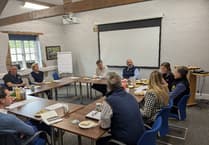PRESIDENT Trump’s announcement of new tariffs has sparked widespread concern across the world and among UK businesses - including here in Central Devon.
As your MP, I have had the opportunity to visit and engage with hundreds of local businesses and voluntary organisations over the years, and it’s clear that the ongoing uncertainty with global trade will be a worry for many – especially at a time when taxes are already being ramped up by the Labour government, through an increase in employers’ national insurance and a hike in business rates.
Tariffs are effectively taxes on any goods coming into a country, and their introduction directly impacts the cost of doing business for many UK firms.
At the beginning of the month, President Trump introduced a sweeping 10 per cent tariff on all UK goods entering the United States, with even higher rates on countries such as China, Japan, Vietnam and those in the EU.
Although a 90-day pause has since been announced for most countries, the 10 per cent baseline tariff remains in place - and that includes goods entering the US from the UK.
The United States may be more than 4,000 miles away, but the implications are very real for businesses here in Central Devon.
On recent visits to Tors Vodka, Sandford Orchards, and the Mill End Hotel, I was able to see firsthand how global trade decisions thousands of miles away can affect our economy.
Take Tors Vodka, a brilliant award-winning local distillery producing high-quality spirits in Okehampton. Although their primary market is domestic, increased costs on imported materials or equipment - driven up by global tariffs - can easily squeeze margins and impact future growth.
Whilst a rise in costs, if passed on to consumers, could easily undermine sales at a time when many households are already facing price hikes due to inflation and rising interest rates.
And in our thriving hospitality sector, all hotels including the likes of the Mill End Hotel are not immune to the impact of tariffs either. Their supply chains are intertwined with global markets - from wines and ingredients to linens and toiletries.
Tariff-induced price hikes could put pressure on overall operating costs.
These tariffs come at a time of heightened economic sensitivity. With UK interest rates currently at 4.5 per cent, borrowing remains expensive for both households and businesses.
The Bank of England is attempting to strike the delicate balance of keeping inflation in check while not stifling economic activity. Should tariffs drive up prices further - either through supply chain disruptions or higher import costs - there’s a risk interest rates could remain higher for longer, further squeezing local businesses.
There are, however, glimmers of resilience. Stock markets have reacted positively to the 90-day pause, and some experts suggest that UK firms could benefit if US-bound goods are redirected here, potentially lowering prices.
As Shadow Chancellor and our local MP, I will continue to champion the interests of our businesses, urging the government to secure a trade deal and to provide support for businesses navigating these challenging times.
Mel Stride
MP for Central Devon





Comments
This article has no comments yet. Be the first to leave a comment.